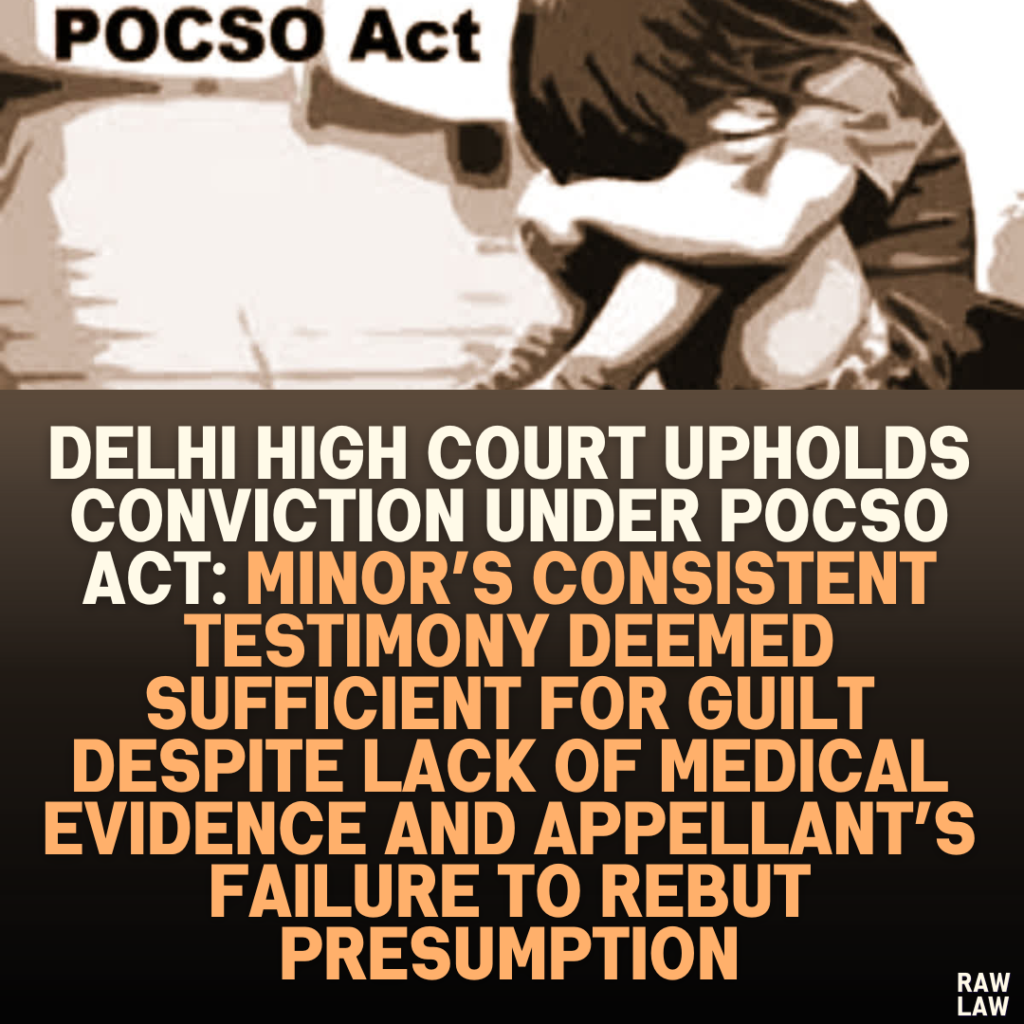Court’s Decision: The Delhi High Court dismissed the appeal, upholding the appellant’s conviction under the POCSO Act and IPC sections related to sexual assault on a minor. The court ruled that the minor victim’s consistent testimony, corroborated by her brother, sufficiently established guilt despite minor inconsistencies and the lack of medical evidence. The appellant’s sentence of rigorous imprisonment was deemed proportional to the crime.
Facts: The case stems from an incident on December 22, 2016, where the minor victim was allegedly dragged into a room by the appellant, who then attempted to sexually assault her. The assault was interrupted by the victim’s brother, who entered the room, leading the appellant to flee. Following the victim’s complaint, the appellant was charged under multiple sections of the IPC and POCSO Act. The victim’s statement was recorded, affirming the alleged events, including the appellant’s threatening behavior.
Issues:
- Whether the minor victim’s sole testimony, supported by her brother, was sufficient for conviction in the absence of corroborating medical evidence.
- Whether inconsistencies in the victim’s statements affected the reliability of her testimony.
Petitioner’s Arguments: The appellant argued that the prosecution failed to establish the case beyond a reasonable doubt, citing the lack of medical evidence and the absence of external or internal injuries on the victim. Further, the appellant highlighted inconsistencies between the victim’s statements and argued that the victim’s account was unreliable, given the absence of independent witnesses from the crowded locality.
Respondent’s Arguments: The prosecution argued that the victim’s consistent and credible testimony, corroborated by her brother, was sufficient for conviction. The respondent stressed that corroboration through medical evidence was unnecessary given the victim’s age and the seriousness of the allegations.
Analysis of the Law: The court analyzed Section 29 of the POCSO Act, which presumes guilt unless the contrary is proved, provided foundational facts are established. The court emphasized that under POCSO, a minor victim’s testimony can suffice for conviction if it is credible and consistent. Citing precedents, the court reiterated that corroboration is not essential if the victim’s testimony is compelling, particularly in sexual assault cases involving minors.
Precedent Analysis: The court referred to Jogi & Ors. v. The State of Madhya Pradesh, highlighting the appellate court’s responsibility to evaluate evidence independently. Further, it relied on State of H.P. v. Sanjay Kumar, asserting that child victims’ testimonies hold significant probative value if found reliable. Additionally, Nirmal Premkumar v. State was cited to support that a minor’s consistent account is crucial in sexual offence cases.
Court’s Reasoning: The High Court reasoned that the minor victim’s account was credible, noting that it was improbable for a young child to fabricate such allegations. While the appellant argued for inconsistencies in the victim’s and her brother’s statements, the court considered these minor and inconsequential to the case. The victim’s consistent narrative, maintained under cross-examination, and the corroboration by her brother’s testimony were deemed sufficient to affirm the conviction.
Conclusion: The court upheld the trial court’s conviction, finding no substantive grounds to interfere with the sentencing. The minor discrepancies raised by the defense were deemed insufficient to discredit the victim’s testimony. The court emphasized that the appellant’s failure to rebut the presumption under Section 29 of the POCSO Act or provide credible alternative evidence led to the dismissal of the appeal.
Implications: This judgment reinforces the probative weight of a minor’s testimony in cases under the POCSO Act, emphasizing the reduced need for corroborative evidence when the testimony is consistent and credible. The court underscored its duty to protect minor victims, aligning with a survivor-centric approach in cases of sexual violence against children.
